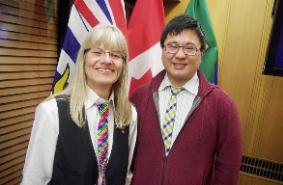
"I really feel pleased that, after all this time, it's now come to a place where city hall and the Pride parade are linked forever more," says Councillor Tim Stevenson. Credit: Nathaniel Christopher photo
Vancouver city council voted unanimously to approve civic designation for the Pride parade May 29, along with the Vaisakhi and Chinatown Spring Festival parades.
The designation means the Vancouver Pride Society (VPS) could save up to $50,000 in city fees for this year’s parade.
“It’s about time,” says former VPS president and current volunteer Shawn Ewing.
“Ten years ago I came here as president and our society was in debt,” Ewing says. “We came here and had to ask the city for an extension, and Tim [Stevenson] was there for us then. But the organization became stronger, and here we are today providing a world-class event.”
Vision Vancouver Councillor Tim Stevenson – who introduced the motion for civic designation last September – sees it as a huge step forward for gay rights.
“I’ve been working hard to establish the ties between the city and Pride for a long time,” he says. “We established the kickoff of Pride at city hall, and we have an event at city hall. City hall is welcoming to our community. But what I’ve wanted to do is make sure that it’s anchored in the city and that it doesn’t have to rely on me being a councillor for the next 50 years to make sure this continues.”
“It’s part of the establishment now, like other events linked with the city,” Stevenson says. “I really feel pleased that, after all this time, it’s now come to a place where city hall and the Pride parade are linked forever more.”
According to a report written by the city’s standing committee on planning, transportation and environment, the Pride parade could receive up to $50,000 of ongoing annual support, while the two smaller parades could receive up to $30,000. Of the three, Pride is the only civic parade still scheduled to take place in 2013.
“It’s amazing news for Pride,” says VPS general manager Ray Lam. “The reality is that Pride has been a civic event for years. We have our launch at city hall, and all of our events are in civic spaces. The city bill for just the parade costs $46,000 to $50,000 a year. This year’s savings would be up to $37,500.”
Lam says the VPS would eventually like to use the savings to pay for a comprehensive economic-impact study to determine the level of financial stimulus generated by the event, as well as how many people it attracts to the city.
The new civic designation also means that fees for community and non-profit entries in the parade will remain the same,” Lam says, adding that he plans to reduce those fees further in the next few years.
The funding for the civic parades will come out of the city’s annual operating budget.
NPA Councillor George Affleck considered Stevenson’s motion, as it was originally introduced last fall, too vague. He expressed concern at the time about the costs and criteria of civic status. But he is satisfied with the motion council just passed.
“We were pleased with the detail of the report,” Affleck says. “We got things we asked for but were denied specifics at the time this was introduced. Staff came back with an excellent report, which really levels the playing field with respect to how other festivals can receive civic designation.”
The report also grandfathers civic status for the parade portion of the Grey Cup celebration, which occurs whenever Vancouver hosts the Canadian Football League’s annual championship. Vancouver has hosted the event 15 times since 1955. It last took place here in 2011 and is scheduled to occur again in 2014.
The Remembrance Day ceremony, which is the only ongoing event produced directly by the city, and the Celebration of Light already had civic event status.
The report sets out criteria by which other festivals can receive civic parade status. They must be operated by a not-for-profit society; have an average attendance of 100,000 or more; be part of a larger celebration or citywide festival; celebrate and promote the diversity and unique characteristics of Vancouver’s communities and neighbourhoods; demonstrate significant local economic impact; take place on a recurring basis; and be free to the general public, with broad access and participation for all age groups. Organizers must also submit a formal event plan produced by a professional.
The new criteria also creates two categories: parades that attract 100,000 to 400,000 attendees, and parades that attract more than 400,000. The Pride parade is the only one that falls into the second category.
The proposal also provides qualifying organizations with a one-time grant of up to $20,000 to assist with the development of a professional event plan, as well as a one-time grant of $10,000 to support the development of a “green parade initiative.”
“My support is based on what’s in the best interest of the city,” says Green Councillor Adriane Carr. “It’s a win for economic reasons because it brings in people who come from all over the world. It attracts a huge amount of visitors, and everyone comes to party. It also brings a great social impact as people come to celebrate the diversity of the city.”

 Why you can trust Xtra
Why you can trust Xtra


